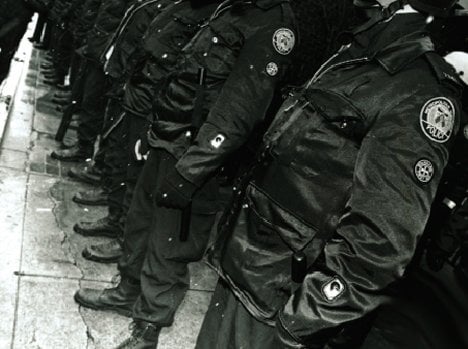
As another year begins in earnest and council scrutinizes the pieces of an operating budget spread out on its floor, one section in particular might draw the eye.
This year, the police department is requesting $843 million, compared to last year’s approved $798 (out of a total 2008 budget of 8.2 bil). Meanwhile, crime has dropped over 16 per cent in the last 10 years. Calls requiring an officer to be dispatched declined by 8 per cent in the last five years. There were 11 per cent fewer calls overall last year than in 2007, though, unsurprisingly, calls are being attended by more officers, who take more time one them.
If hiring more police has meant less crime, their request may be justified. That’s not an easy relationship to untangle, but a closer look at the numbers raises questions.
While crime overall has been dropping steadily, certain specific crimes have been increasing: robberies, fraud, drug offences and gun offences. Some of these – along with cyber-crime, fraud and child porn, which Toronto cops have earned a rep combatting – occur in the context of national and international underground markets but take large amounts of local police time. Should the RCMP be doing more?
I put that question to Pam McConnell, councillor and vice-chair of the Police Services Board. “The federal government has crapped out on policing,” she says. “Policing costs are as important to municipalities as transit, in terms of investments that the federal government has been making. And what they’ve quietly done, almost secretively done, is withdraw their support.”
When McConnell went to the Federation of Canadian Municipalities, she found other cities had similar concerns. Small towns that are policed by RCMP officers and pay the shot for that have 10 per cent of their police budget refunded, based on estimates that Mounties spend an average of 10 per cent of their time on national matters.
Why shouldn’t we reap extra money from the feds for more nationally connected work done by T.O. cops? This would have meant $84 million in new money last year. McConnell says she’s fine with local cops doing what they’ve been doing, as long as the feds chip in.
And yet it’s the RCMP that’s breaking new ground. For instance, the British Columbia office is the first to experiment with community safety officers. These are unarmed officers tasked mostly with “quality of life” issues such as public drunkenness, vandalism and other matters that don’t seem to require high pay, rigorous training and a sidearm.
The program is modelled in part after the UK’s more fleshed-out but still fledgling police community support officer program. In fact, police funding in the UK has actually been falling (it can do that?) in recent years.
British right-wing think tank Policy Exchange has urged “workforce modernization” of police forces, which they say would imply “matching specific skills to particular tasks rather than depending on police constables to fill catch-all roles, a much more expensive practice.”
PE is careful to point out that this wouldn’t result in “civilianization” of the force, but the subtext is clear: people are often getting someone with cuffs and a gun when all they really need is someone who’s good at talking and knows the relevant laws.
The Australian Federal Police are also experimenting with such “modernization,” having recently done away with the rank of constable altogether in favour of “lateral entry,” placing new recruits based on their skills and knowledge rather than time spent on the beat.
When I ask McConnell if she thinks we could experiment with this type of model here, she hedges a little, but the idea doesn’t seem to strike her as insane.
“One of the things we should be looking at,” she says, “is how you get people into leadership positions. When someone comes in with a masters in psychology or criminology, how do you make sure he or she doesn’t then plod through the five years to get to sergeant?”
McConnell says the Police Services Board is looking at how to foster more active roles for civilian members of the force. But for now, the priority is deciding whether paid duty officers need to be at every TTC or city-funded construction site. Why is the city paying time and a half to some of the highest-paid officers in the country when someone in a reflective vest would suffice?
news@nowtoronto.com













